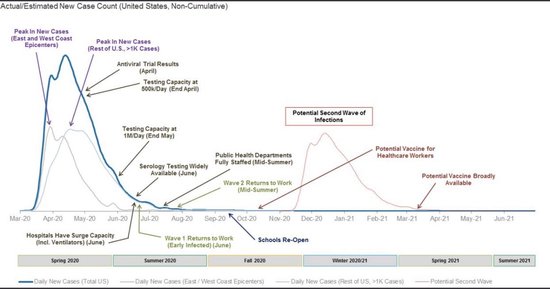AntiCapitalist Meet-up Hodge-podge
Below is a collection of things that I’ve been saving up — including the problems of CV-19, MMT, neoliberalism, and other things relating pandemics to the economy. If there’s a point to this selection it is to remind ourselves what will happen in 2021 with Larry Summers now advising the Biden campaign — there’s still a lot of critical work to be done in 2020.
The week is about what looks like propaganda amplifying a RW selective reading and what spin looks like:
Hit—Dems Soft on China/CoronaKey Points:
● The Democratic party is soft on China and fails to stand up to them.
● Democrats called President Trump’s China Travel Ban xenophobic, even though that travel ban saved lives.
● Nancy Pelosi urged San Francisco to get out to Chinatown to celebrate, even though the virus was raging.
● Democrats are more obsessed with being politically correct and what we call the coronavirus than standing up to China and making sure this doesn’t happen again.
● Joe Biden, the Democratic Party Nominee, has been soft on China his whole career. He doesn’t even think China is a rival to us, and he brought his corrupt son Hunter on a taxpayer funded trip to China.
Key Facts:
● Joe Biden has been weak on China his whole career, and brought Hunter on a trip to China paid for by taxpayers .https://www.nationalreview.com/2020/03/joe-biden-is-chinas-choice-for-president/
● Nancy Pelosi called for people to come to Chinatown weeks after Trump’s China Travel Ban https://www.washingtonexaminer.com/news/pelosi-encouraged-public-gatherings-in-latefebruary-weeks-after-trumps-china-travel-ban
● Democratic lawmakers have raised similar objections. “I’ve said it once & I’ll say it again loud enough for the @WhiteHouse, @FoxNews, & everyone else to hear: coronavirus does not discriminate. Bigotry against people of Asian descent is unacceptable, un-American, & harmful to our COVID-19 response efforts,” Sen.Elizabeth Warren (D-Mass.) tweeted Tuesday. https://www.politico.com/news/2020/03/18/trump-pandemic-drumbeat-coronavirus135392
Despite Trumpery, there are some underlying long-term issues that will not be solved with a change in POTUS even if it’s a move in the correct direction.
Foremost in mind on the left in recent decades is how far the US Democratic Party and the British Labour Party have travelled down the path to neoliberalism; while largely disregarded has been the fact that this was a common trajectory of all social democratic parties.
[…]
In contrast to the radical proposals for ‘taking capital away from capital’ that emanated from within European social democratic parties in the 1970s – from the union-led socialization of the corporations in Sweden to the nationalization of the banks in France – the policies being advanced today by socialists inside the centre-left parties look very modest. The emulation of the glory days of the New Deal or of postwar social democracy is inherently limited by the impossibility of restoring the particular social and economic conditions of those days. The past four decades of the internationalization of capitalist states – not least through the removal of capital controls and the free trade agreements that codified their sponsorship of neoliberal globalization – have similarly rendered implausible any notion of merely rebooting the stifled socialist agendas that emerged within social democratic parties at the height of the crisis of the Keynesian welfare state in the 1970s.
Being in no position to take over the ‘commanding heights of the economy’ – or even to introduce capital controls without immediately inducing more severe economic hardship than the austerity they are pledged to end – such a government would of necessity tread cautiously through piecemeal interventions against capitalist power and advance reforms which risk being overwhelmed in these conditions. All this would sustain the very significant oppositional elements inside the centre-left parties at every level, and especially among the elected career politicians for whom a serious commitment to socialism, however gradualist, is regarded as a dangerous chimera. This poses the questions of how the socialist leadership of such a government could sustain its long-term ambitions, and what would distinguish its policies from the types of reforms advanced by progressive liberals and moderate social democrats today.[…]In addition to the concern to break with austerity and implement radical reforms to the immediate benefit of working people, the new socialist discourse has focused considerably on the crucial issue of economic democratization. This has created important political space for casting a new challenge to capitalist control over investment, production, and distribution in a positive light. Yet what has been proposed is exceedingly modest, primarily involving various schemes for partial worker ownership and participation in management at the level of the firm. This obviously reflects the current balance of class forces as well as the lack of strategic clarity and political capacities left forces can bring to bear today.[…]Moreover, while the emphasis on policies to democratize corporate governance is driven by the more general concern to democratize the economy, the focus of these reforms underestimates the potential of democratizing workplaces that stand, to some degree at least, outside the competitive discipline of profits and competition.[…]Elizabeth Warren asserts that unlike other states – including China, Japan, and Germany – the US lacks a centralized industrial policy, with R&D programs fragmented across myriad state agencies. A new Department of Economic Development, which would replace the Commerce Department, would consolidate these efforts and develop a single, coherent, market-oriented industrial strategy. That this agency would also subsume the Office of the US Trade Representative reflects Warren’s concern that over the neoliberal period, the power and autonomy of state agencies promoting the internationalization of capital have been consistently enhanced.* In Warren’s terms, this amounts to the empowerment of ‘government agencies that undermine sustainable American jobs’. By consolidating these programs and offices ‘in one place’, she hopes ‘to make it clear that the unified mission of the federal government is to promote sustainable, middle-class American jobs’. Her plan thus seeks to counteract financial short-termism by building the capacity within the state to systematically undertake long-term investment planning.[…]There is no simple technocratic means to raise government revenues either through taxation or the monetary financing of budgetary deficits. The redistribution of society’s resources is inseparable from the redistribution of power. An over-riding limit in all the steps towards taking control over economic life, even in the case of relatively modest expansions of social provision, is the power of capital to exit and invest abroad (along with the refusal of capital to keep coming in). Overcoming that threat and getting control over the funds to complete the socialist project must, at some point, raise the necessity of imposing controls on finance. It is, however, critical to see this not as merely ‘keeping capital at home’ along the lines of ‘economic patriotism’. If such controls are to be meaningful, they must extend to what happens to this capital even if it is forced to remain.*As discussed in Leo Panitch and Sam Gindin, The Making of Global Capitalism, London: Verso, 2013, chs. 10 and 11.
It seems likely that we will be in a environment of high unemployment even after a vaccine tames the virus. Modern Monetary Theory (MMT) will be highly relevant in that environment.
Any recovery is a year away at best:

Doubling or tripling testing (and seriology) is only a first step to recovery, especially since there are mutations and repeat infections for those who recover.
Dawkins coined “memes” to describe a unit of culture analogous to genes. But microbes & vitality may be closer to the mark.During a pandemic ffs we have to be meticulous abt not spreading disinfo—a pathogen that spikes cortisol, suppresses reason & disinhibits behavior.
Emphasizing again the radical MIT conclusion: Our brains *prefer*—short term—lies over truth, fiction over fact. Fiction is built with protagonists, antagonists, plot, heightened language. That's why Netflix is intensely calming these days. Facts are thorny. Fiction is organized.
Darn that barbarism and its masked face.
What’s interesting is what the Fed thinks a “narrative sign restriction” is.









